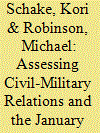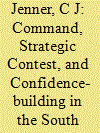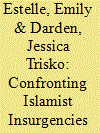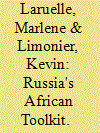|
|
|
Sort Order |
|
|
|
Items / Page
|
|
|
|
|
|
|
| Srl | Item |
| 1 |
ID:
181726


|
|
|
|
|
| Summary/Abstract |
Long treated as marginal to United States strategic interests, political, economic, and security, developments on the African continent have forced a reconsideration of Africa's geopolitical (and geoeconomics) significance in the twenty-first century. Moreover, the success of efforts to lower carbon emissions and other measures to combat the effects of climate change are highly dependent on access to Africa's mineral reserves—another factor driving both global and regional powers increasingly to become engaged on the continent. Criticism of former President Donald Trump's reported statements about African countries notwithstanding, the significant shift towards analytical realism under that administration—including not treating Africa in isolation from global trends—should be a lasting legacy.
|
|
|
|
|
|
|
|
|
|
|
|
|
|
|
|
| 2 |
ID:
181731


|
|
|
|
|
| Summary/Abstract |
What explains the Russian Federation's Arctic military buildup? Scholarly assessments have pondered this question many times, providing descriptive analyses of its buildup or finding Russia's motivation in high-level policy. This article complements that work by examining Russian military theory in the context of the Arctic, revealing the relationship between geo-economics and military strategy in the region. It shows that Russian writers view Arctic military investments as defensive in nature, designed to protect critical economic and security infrastructure from attack by the United States, an adversary that, in their view, seeks to destroy such critical infrastructure as part of a war-winning strategy. Rather than responding to military deployments in an inconsistent tit-for-tat that contributes to a security dilemma, the United States should develop firm, but more predictable, military responses that may help slow the Arctic escalation spiral.
|
|
|
|
|
|
|
|
|
|
|
|
|
|
|
|
| 3 |
ID:
181733


|
|
|
|
|
| Summary/Abstract |
The events of January 6, 2021, when violent rioters attacked the Capitol building in Washington in order to disrupt validation of the 2020 presidential election, forced an unprecedented reckoning with the state of American politics. Members of Congress struggled to account for the rhetoric that gave rise to the event; law enforcement grappled with the challenge of holding accountable those who perpetrated the violence; and journalistic outlets wrestled with reporting a complex web of conspiracy theories and disinformation that gave rise to the insurrection. But for senior military leaders, the question was how to explain the troubling presence of active duty servicemembers and veterans in the first attack on the American seat of government in two centuries. The result is a profound and urgent discussion in U.S. civil-military relations.
|
|
|
|
|
|
|
|
|
|
|
|
|
|
|
|
| 4 |
ID:
181723


|
|
|
| 5 |
ID:
181732


|
|
|
|
|
| Summary/Abstract |
Wealth and power have steered global prestige from East to West and back again. History's serial relocations of economic growth and corollary power changed the character of the South China Sea into a conflictual conduit for Eastern and then Western colonialism, a strategic sea space in world war, and now a cockpit of contest to maintain or revise the rules-based international order. For the first time in several centuries, a Chinese blue water navy is projecting power across the Indo-Pacific and prosecuting a national maritime security strategy to transform the South China Sea into China's sovereign territory. In large part, the winner of the Sino-American struggle for preponderance in the South China Sea will steer the course of the twenty-first century in the Indo-Pacific.
|
|
|
|
|
|
|
|
|
|
|
|
|
|
|
|
| 6 |
ID:
181727


|
|
|
|
|
| Summary/Abstract |
The proliferation of Salafi-jihadi insurgencies across Africa challenges the United States’ counterterrorism approach. From its inception, the insurgency in Cabo Delgado, Mozambique was driven by local and foreign dynamics, which have been complicated by additional external intervention in the conflict. Using the Cabo Delgado insurgency, we demonstrate how efforts to address its global dimensions, such as the group's affiliation with the Islamic State, can work against attempts to mitigate its local drivers. We conclude with recommendations for a more effective U.S. response that takes both the local and global dynamics into account. This article builds on our February 2021 report “Combating the Islamic State's Spread in Africa: Assessment and Recommendations for Mozambique,” published by the American Enterprise Institute.
|
|
|
|
|
|
|
|
|
|
|
|
|
|
|
|
| 7 |
ID:
181730


|
|
|
|
|
| Summary/Abstract |
Claiming a more realistic and interest-driven approach to foreign policy, European Union (EU) Commission President Ursula von der Leyen has presented her team as a “geopolitical” commission. While the EU exerts a strong influence on its neighborhood when it is able to set incentives, its impact on states or regions is restricted if these incentives are missing. Here, only the combined political and economic clout of the member states can make a difference. The Eastern Mediterranean is a region where both shortcomings coincide: The EU cannot offer membership, and the member states do not speak with one voice. The result is the failure to perform “geopolitical actorness.” This weakness becomes apparent on different levels of conflict in the Eastern Mediterranean: the bilateral, the regional, and the international.
|
|
|
|
|
|
|
|
|
|
|
|
|
|
|
|
| 8 |
ID:
181724


|
|
|
|
|
| Summary/Abstract |
The Biden administration faces the opportunity to reset U.S. policy towards Africa and possesses a variety of tools to use in doing so, including traditional diplomacy, economic statecraft, development assistance, and military engagement. With the increased militarization of U.S. foreign policy over the past few decades, there is an unfortunate tendency to default to military engagement when confronted with even remote threats to U.S. national security interests, and Africa is no exception. With vital security interests in Africa, it can be argued that military engagement should be limited in its application and targeted to those situations that do not lend themselves to solution through traditional diplomacy or development assistance.
|
|
|
|
|
|
|
|
|
|
|
|
|
|
|
|
| 9 |
ID:
181722


|
|
|
| 10 |
ID:
181729


|
|
|
|
|
| Summary/Abstract |
Term limit norms in Africa have been deteriorating rapidly since 2015, reversing a positive trend over the previous two decades. This trend has important implications since longer presidential tenures are linked to increased corruption, reduced civil liberties, and higher rates of conflict. Even after term limit restrictions have been lifted, there is a pattern of incumbents manipulating electoral outcomes to stay in power. This reflects the declining popularity of these leaders and points to the self-interested motivations for their extended tenures vis-à-vis broader service to the public. It further highlights that the evasion of term limits does not happen in isolation but is part of a broader pattern of undermining the rule of law and weakening democratic institutions. Failure to reverse the downturn in respect for term limits risks bringing Africa back to an era of de facto “presidents for life” and one-party states.
|
|
|
|
|
|
|
|
|
|
|
|
|
|
|
|
| 11 |
ID:
181725


|
|
|
|
|
| Summary/Abstract |
Today, Russian influence on the African continent is still anecdotic compared to the People's Republic of China, the United States, and former colonial powers, such as France. Yet, Moscow has committed to reasserting itself as an alternative pole of influence to China and Western countries in the eyes of some African elites. This article analyzes two key components of Russia's African toolkit: its media outlets such as RT and Sputnik, which have managed to impose themselves on the African media landscape, and its entrepreneurs of influence, in charge of influence campaigns of different scopes. The article contends that Russia's media success relies more on the appropriation of its informational content by African actors with their own political agendas than on Moscow convincing African audiences of the legitimacy of its foreign policy or political model, and that entrepreneurs of influence may play a useful, but limited, role in testing new parameters of influence.
|
|
|
|
|
|
|
|
|
|
|
|
|
|
|
|
| 12 |
ID:
181728


|
|
|
|
|
| Summary/Abstract |
This article examines how events unfolded in the aftermath of the deaths of American servicemembers in Niger in 2017. It shows that there was remarkably little casualty aversion on the part of either the American public or the elites and examines why U.S. military policy towards Africa is so resistant to change, even when circumstances appear propitious.
|
|
|
|
|
|
|
|
|
|
|
|
|
|
|
|
|
|
|
|
|